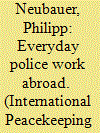| Srl | Item |
| 1 |
ID:
186082


|
|
|
|
|
| Summary/Abstract |
Nowadays, police officers are regularly deployed as members of multilateral peace operations. This article examines how these experts implement their mandates and how we can understand their activities. For this, we draw on a set of 90 semi-structured interviews with European police experts who have experience in multilateral policing. We find that, to navigate their work abroad, European police officers primarily rely on their own domestic policing experience, their experience from previous deployments and the experience of colleagues they meet in the mission. The extent to which they can rely on their own experience is shaped by how much discretion they find at their disposal. We identify two conditions limiting their discretion: the preferences, policies and histories of host states, and institutional lock-in effects within missions that reduce officers’ room to manoeuvre over time. While we also find that officers do not normally draw on international guidance documents in their everyday work, missions can nevertheless be regarded as sites where more localized transnational policing practices emerge. These mission-specific transnational practices are formed, over time, by successive cohorts of police officers from different countries.
|
|
|
|
|
|
|
|
|
|
|
|
|
|
|
|
| 2 |
ID:
143799


|
|
|
|
|
| Summary/Abstract |
The problematic nature of biased knowledge held by professionalized experts and aid workers in statebuilding is already recognized. Yet we still lack understanding on knowledge formation and transfer in the everyday of statebuilding operations. I argue that the actors on the ground gain their knowledge in powerful and self-referential socialization processes. The aim of this article is to reconstruct via an interactionist theoretical framework, how German police officers, deployed for a maximum of 12 months, perceive and interpret other actors and their mission in Kosovo, how they gain this knowledge and how it relates to their work. I draw two conclusions: first, the police officers, both experienced and newcomers, share mostly negative attitudes towards local actors and the mission. Second, the most important mode of knowledge formation and transfer behind these similar attitudes is the informal interaction with experienced interveners and local actors, not official trainings or information. These informal modes of knowledge transfer have a limiting effect on the practice of statebuilding. New knowledge is difficult to gain in short-term deployment, instead stereotypes are reaffirmed. Interveners are not independent units and the social practice of an operation cannot simply be planned; it develops on the ground in specific forms.
|
|
|
|
|
|
|
|
|
|
|
|
|
|
|
|